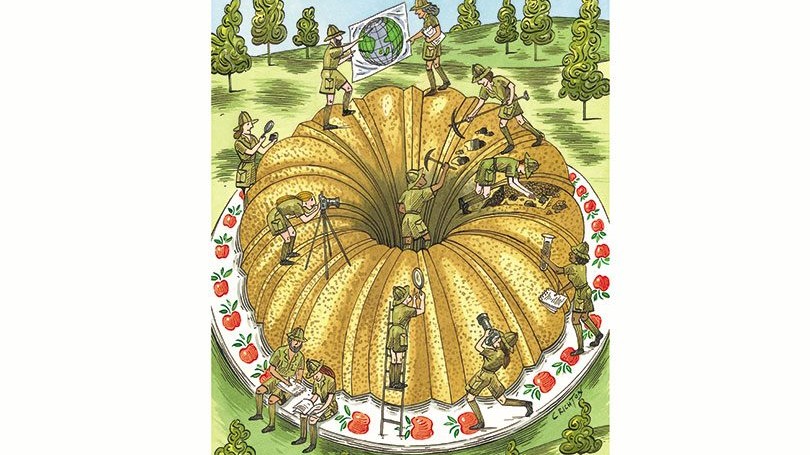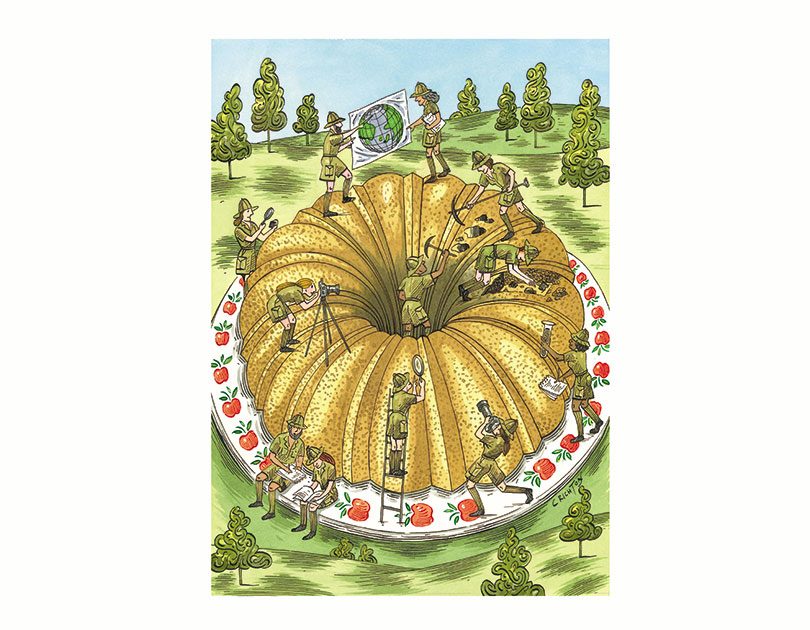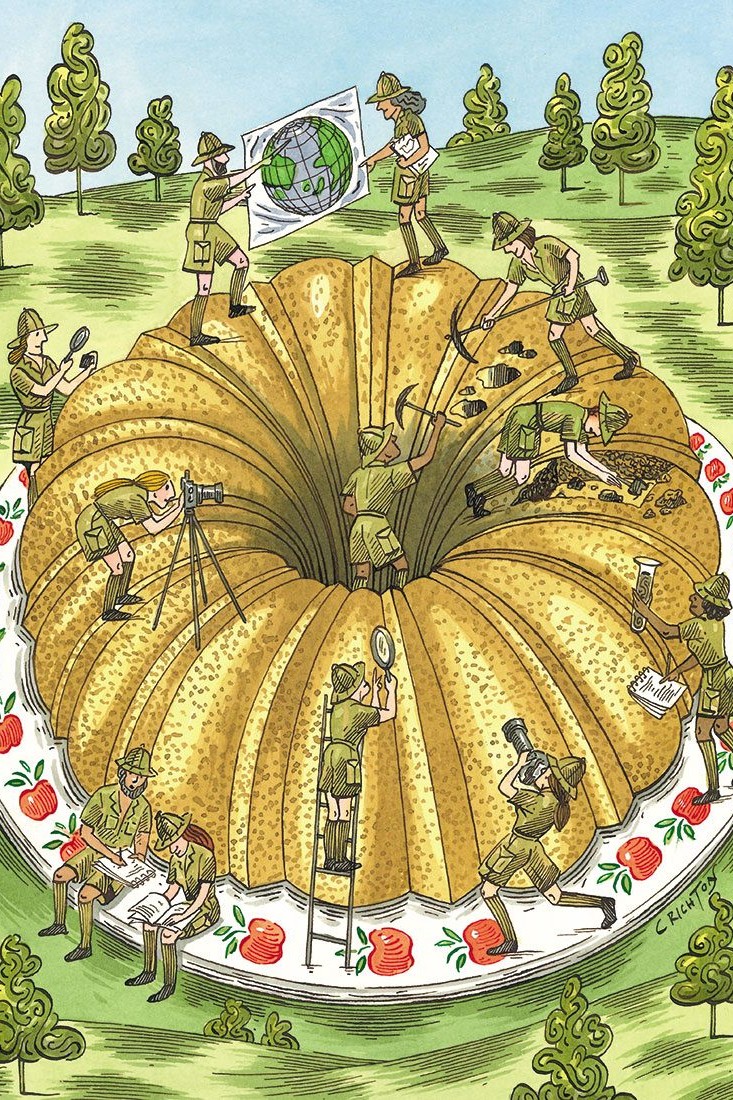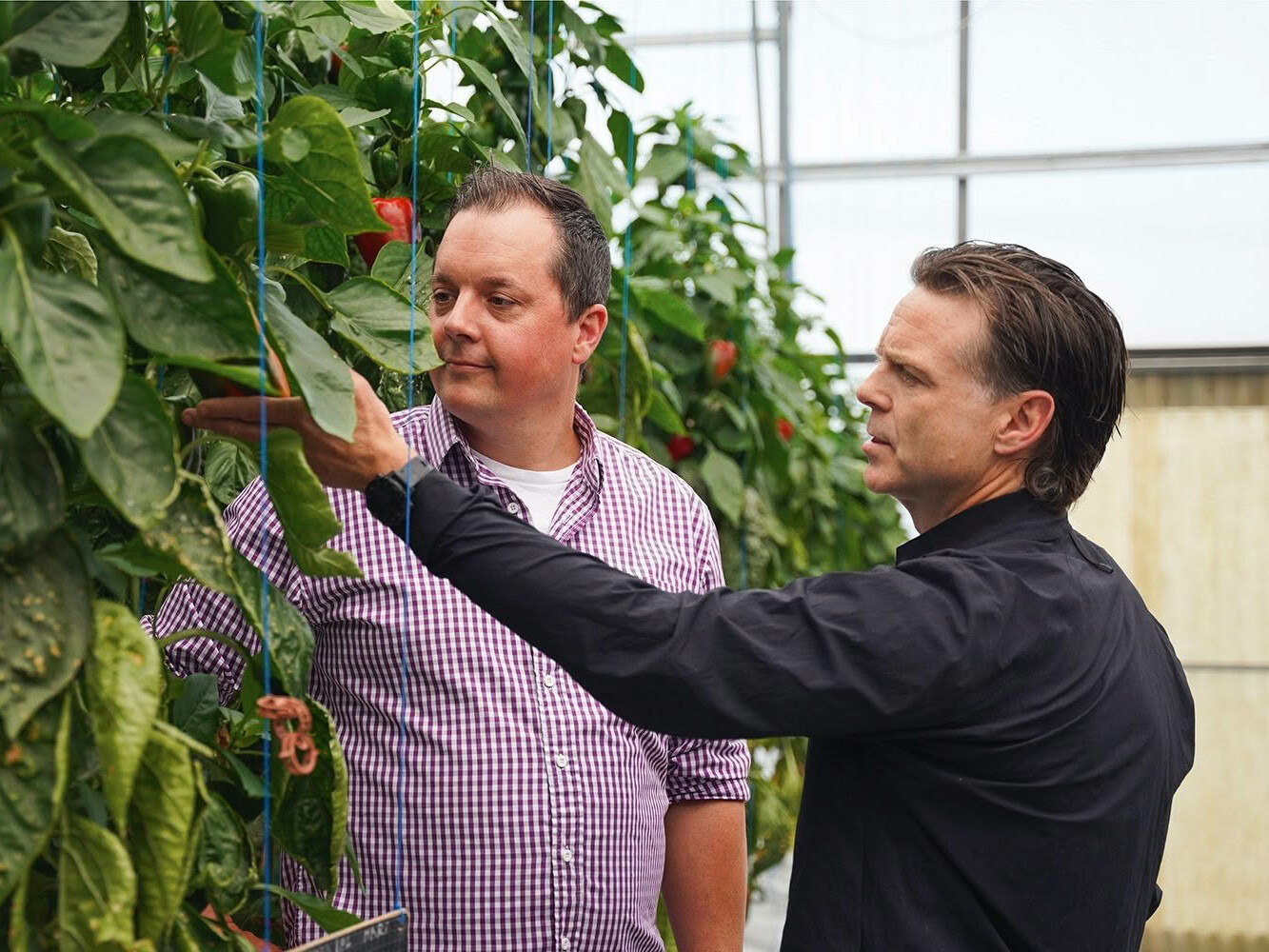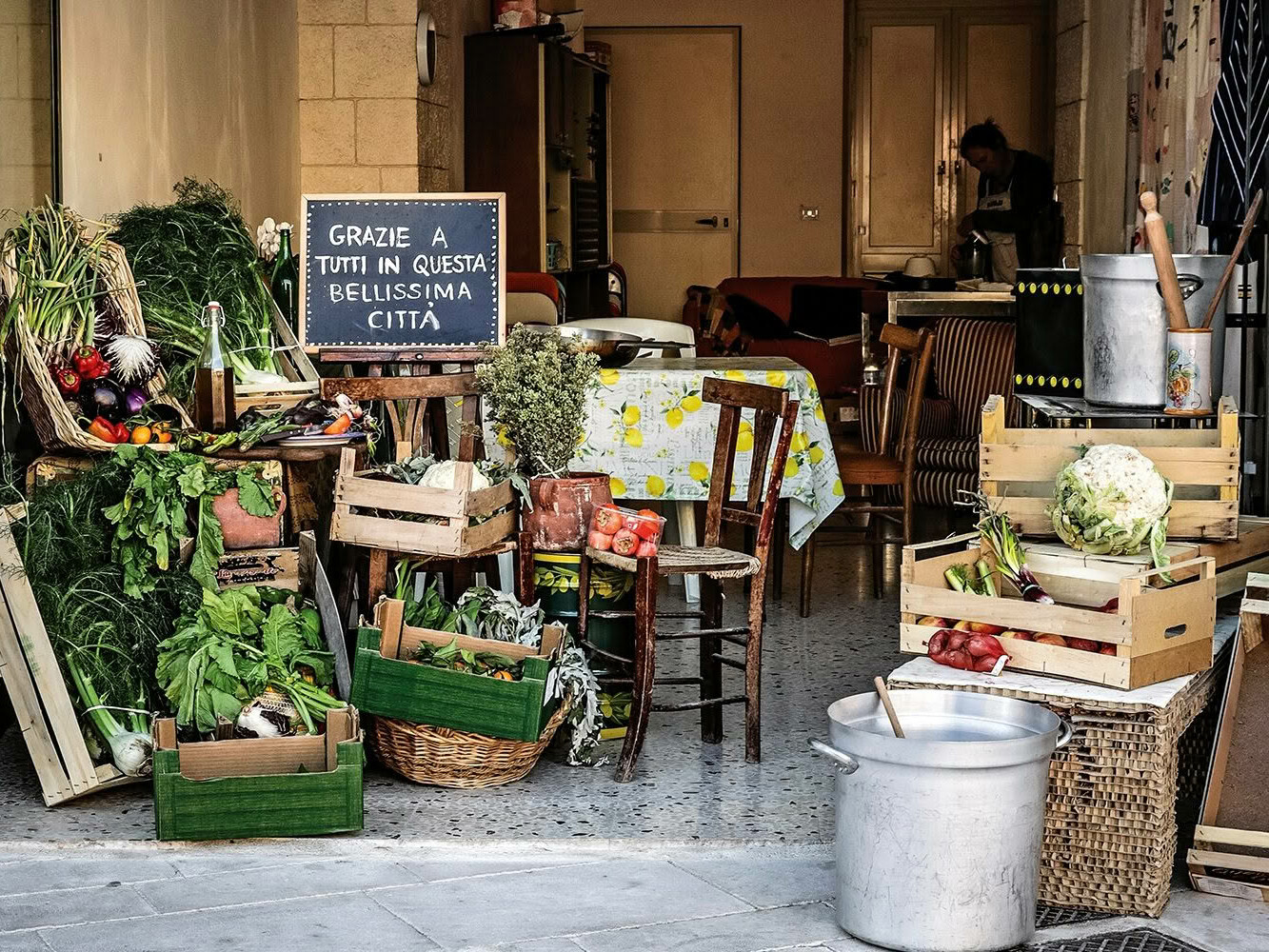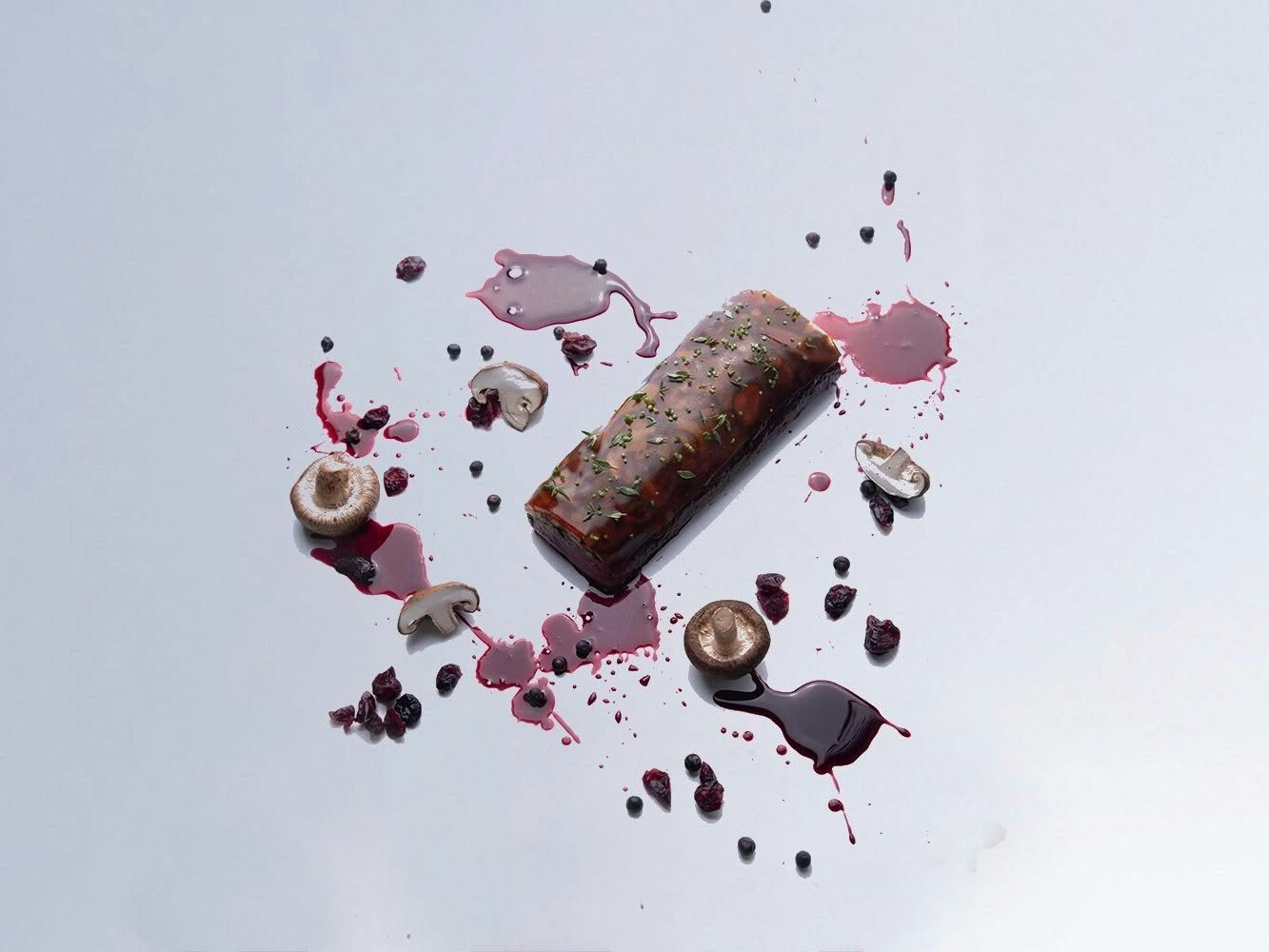It may look like a simple cake but the story it tells is one of power, politics and food, says Professor Tracy Berno.
 Food is inherently political. Every decision we make about food has consequences, yet we are often oblivious to what those consequences are. Many, if not most, of the world’s major issues have their origins in our contemporary food system, as food is at the nexus of complex and interrelated ecological, economic, social, cultural, political and philosophical issues. There is strong scientific evidence to suggest that the way we produce and consume food is a key driver of environmental, and subsequently, social and cultural change on multiple levels – from local to global – through impacts on climate change, loss of biodiversity, the use of fresh water, interference with global nitrogen and phosphorus cycles, greenhouse gas emissions and land-system changes. As Professor Walter Willett and his colleagues point out in the 2019 EAT-Lancet report, “… global food production is the largest pressure caused by humans on Earth, threatening local ecosystems and the stability of the Earth system.” How and what we eat have a direct impact on environmental, social, cultural, political and economic sustainability. Personally, I believe that if many of our problems have their origin in the food system, then so do many of the answers. This is food politics, and my seemingly innocuous apple and salted caramel cake tells this story.
Food is inherently political. Every decision we make about food has consequences, yet we are often oblivious to what those consequences are. Many, if not most, of the world’s major issues have their origins in our contemporary food system, as food is at the nexus of complex and interrelated ecological, economic, social, cultural, political and philosophical issues. There is strong scientific evidence to suggest that the way we produce and consume food is a key driver of environmental, and subsequently, social and cultural change on multiple levels – from local to global – through impacts on climate change, loss of biodiversity, the use of fresh water, interference with global nitrogen and phosphorus cycles, greenhouse gas emissions and land-system changes. As Professor Walter Willett and his colleagues point out in the 2019 EAT-Lancet report, “… global food production is the largest pressure caused by humans on Earth, threatening local ecosystems and the stability of the Earth system.” How and what we eat have a direct impact on environmental, social, cultural, political and economic sustainability. Personally, I believe that if many of our problems have their origin in the food system, then so do many of the answers. This is food politics, and my seemingly innocuous apple and salted caramel cake tells this story.
As you can appreciate, food politics is a complex field of study that considers huge issues, or ‘wicked problems’ as they are known. I teach a class on food politics at Auckland University of Technology (AUT) where we tackle these wicked problems head on. In my 31 years as an academic this is my favourite class. Why? Because knowledge is power and by engaging in critical discourse about food politics, over the semester my students become empowered to do something about it and effect change. They leave the course never looking at food, or their food-related decisions, the same again. Indeed, one of my moments of ‘lecturer glory’ was when a student, with a smile on their face, advised me that I had forever ruined their trip to the grocery store because now they were compelled to read labels, consider where the food had come from and under what conditions it was produced and question how their purchasing decisions were being manipulated. But now, they told me, they made different, informed decisions and felt better for it; they were making a difference. Perfect: mission accomplished one student at a time.
So how does one tackle such huge issues without becoming overwhelmed or succumb to learned helplessness? How can wicked problems be made more understandable and personal? One of the challenges I face as an educator is how to start a conversation about issues that are so huge, so massively significant, that they are almost incomprehensible. And that brings me back to the cake.
Food is a great conveyor of narrative. Food tells a story of time and place; it tells a story of culture and identity. But it also tells a story of politics: who produced the food and under what conditions; global versus local food systems; who profits from the food and at what cost (social, environmental, economic, political); privilege and hardship; food sovereignty; ethics and sustainability. There are so many stories to be told if you know how to listen. As my knife broke the salted caramel glaze on the apple cake, my students gathered around. The cake was about to tell them a story…
SUSTAINABILITY AND ETHICS
We often think of sustainability in environmental terms, but there is so much more to it. The recipe for the cake is one that reflects my own life journey. I got the recipe more than 30 years ago from a friend. It has changed and evolved over time, just like I have. It has adapted to the many countries I have lived in and the many friends I have shared it with. The smell of apples and spices filling my kitchen as it bakes takes me back to those times as well as grounding me in the present. It nurtures and sustains me. When I share it with others, it nurtures and sustains them as well.
The cake is made with apples and walnuts, so I make it in autumn. It is seasonal and local. It just so happened that this time I baked it for my class, it was made with organic apples and eggs from my local farmers’ market. This opens a conversation about ethical production, organic versus conventional agriculture and global versus local food systems. This leads to consideration of how buying local supports our farmers and local food systems but also the realisation (and reality) that without the global food system, I may not have been able to make the cake. After all, who wants to start a recipe with, “First build your greenhouse, then plant your vanilla orchids and cinnamon tree. Once they have matured (approximately 4 years), preheat the oven to 180°C.” And what about the ethics of the cake? How much do we know about the workers who produced the ingredients and the conditions under which they were produced? If it had been a chocolate cake, this would have been a very different conversation.
FOOD SECURITY AND SOVEREIGNTY
My use of organic eggs and apples serves as a further catalyst for discussion about the accessibility of food for people in Aotearoa and who makes the decisions about what we eat. For example, the recent changes to egg-farming regulations saw a critical shortage of eggs and a significant increase in their cost. What are the consequences when something we have generally taken for granted as being available at an affordable price suddenly changes? And the organic apples – what does the uncritical assumption of organic being ‘better’ mean, and for whom? These are challenging questions.
Even the flour with which my cake was made opens another conversation about food politics. The majority of our flour is imported from overseas. Many of the most vulnerable people in our society rely on inexpensive wheat-based products for their food. Recent disruptions to our food system stemming from COVID-19 and the war in Ukraine saw the availability of wheat become restricted and its cost soar. What has this meant for ongoing food security or insecurity for people in New Zealand? I was short of flour when I was making the cake. Since it was too late at night to go to the shop, I rummaged around my pantry and substituted other types of flour. This tells a story of both food security (I have several types of flour to hand) as well as food literacy (I know how to bake and I have the knowledge, the food literacy, to be able to improvise but not everyone does). And I have to say that the substitutions were better than the original, so my recipe has evolved yet again, with new stories to convey.
There are many more stories that the cake can tell about food politics, but this is probably enough ‘food for thought’ for now. For my students, however, the story of this simple (yet so very complex) cake is part of their journey of never looking at food quite the same way again.
SEE MORE FROM CUISINE
Design File / Sara Bruce / Exhibit A / Auckland
The contents in a cold glass should be savoured. Having one superb…
When only the very best will do
How Bocuse d’Or Team New Zealand will meet the highest standards at…

